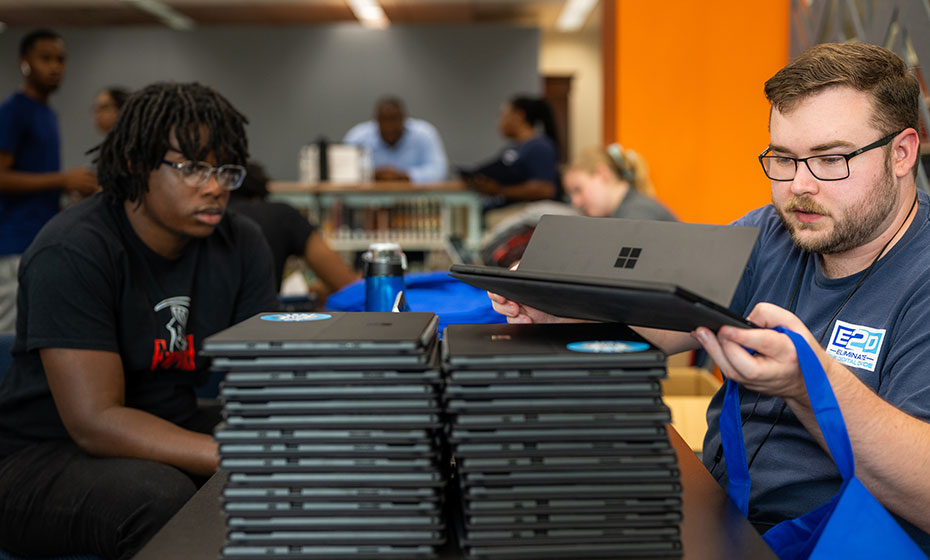Bridging the Gap: Duke Energy Powers Students With Laptops
Rhea-AI Summary
Duke Energy has partnered with E2D (Eliminate the Digital Divide) to donate over 16,000 laptops to 10 historically Black colleges and universities (HBCUs) in North Carolina over three years. This initiative aims to close the digital divide and support students who arrive on campus without personal computers. On September 9, Duke Energy volunteers distributed laptops to 225 freshmen at Johnson C. Smith University (JCSU).
E2D, a Charlotte-based nonprofit, refurbishes donated laptops in student-led technology labs and has distributed at least 48,000 computers since 2013. The program not only provides essential tools for academic success but also offers workforce opportunities for high school students who gain valuable STEM skills while refurbishing the laptops.
This effort aligns with Duke Energy Foundation's focus on economic mobility and STEM education, as well as Charlotte's Mayor's Racial Equity Initiative, which aims to address systemic inequities and bridge the digital divide.
Positive
- Duke Energy pledged to donate over 16,000 laptops to 10 HBCUs in North Carolina
- Partnership with E2D aligns with Duke Energy's focus on economic mobility and STEM education
- Initiative provides workforce opportunities for high school students, equipping them with tech skills
Negative
- None.
News Market Reaction
On the day this news was published, DUK gained 0.40%, reflecting a mild positive market reaction.
Data tracked by StockTitan Argus on the day of publication.
By donating used laptops to E2D, corporations can help close the opportunity gap between those who have computers and those who do not
NORTHAMPTON, MA / ACCESSWIRE / October 2, 2024 / As a new school year kicks off, freshmen at Johnson C. Smith University (JCSU) are receiving more than just a warm welcome - they're getting a critical tool for their academic success. On Sept. 9, Duke Energy volunteers handed out laptops to 225 students who arrived on campus without one.
This initiative is part of a partnership with E2D, short for Eliminate the Digital Divide, a Charlotte, N.C., nonprofit that refurbishes donated laptops in student-led technology labs and distributes them to those in need. With help from Duke Energy and other corporate sponsors, E2D has distributed at least 48,000 computers since 2013.
The company's recent pledge of more than 16,000 laptops over three years will enable E2D to further close the opportunity gap between those who have computers and those who do not. These devices will be distributed to 10 historically Black colleges and universities (HBCUs) across North Carolina.
"With Duke Energy's commitment to donating laptops and volunteer hours, we'll be bridging the digital divide for a much larger swath of the state," said E2D President Pat Millen.
Closing the digital divide
College students without a laptop face significant disadvantages, including limited access to online resources and a lack of flexibility in their study environment. These issues can lead to increased stress and negatively impact their academic performance.
Receiving a laptop can have a profound and immediate impact on students without one, said John Oliver, Ph.D., project manager of JCSU's Charlotte's Inclusive Tech-Innovation Project (CITIP).
"The joy on students' faces when they receive their laptops speaks volumes about the difference this program is making," Oliver said. "Many express their shock and appreciation that someone they've never met is thoughtful enough to provide them with this vital resource."
Duke Energy's involvement with E2D began five years ago when Dominique Johnson, vice president of the Duke Energy Foundation, connected with Millen at a Charlotte event. She was immediately struck by the potential of E2D's mission, which aligns with the Foundation's long-standing focus on economic mobility and STEM education.
"College is hard even when you do have the resources," she said. "Some of these students were doing schoolwork on their phones."
Johnson found an ally in Duke Energy's Mark Cook, managing director of IT infrastructure, operations and CIOPS. As someone who started his IT career providing help desk (and desk-side) support, he understands the imperative of working technology. Cook and his team navigated internal processes to enable laptop donations to E2D, which paved the way for a commitment of more than 16,000 computers over three years.
Equipping students with the tools to succeed
The need for this initiative was underscored in 2023 when over a third of JCSU's students arrived on campus without a personal laptop. Within three weeks of learning about the situation, E2D identified the students in need and distributed laptops, ensuring that these students had the tools they required to succeed.
To assess whether JCSU's situation was unique, E2D hired a staff member to survey other HBCUs in the state. The findings were clear - almost every school faced similar challenges.
This realization spurred Duke Energy to broaden its support, integrating the program into its broader mission of promoting economic mobility, climate resilience, and opportunity and inclusion.
In 2021, the city of Charlotte, under Mayor Vi Lyles' leadership, launched the Mayor's Racial Equity Initiative - a
Beyond laptops, E2D also provides workforce opportunities by hiring young staff, many from Title I high schools, to refurbish the laptops, equipping them with tech skills and a paying job.
"These high schoolers are in the lab, learning valuable STEM skills that will be relevant across industries, all while earning more than minimum wage," Johnson noted.
Millen hopes Duke Energy's leadership in this space will inspire other corporations to follow suit.
"We're leveraging Duke Energy's example to encourage other companies to join this effort," he said. "Duke is setting a new standard for corporate responsibility in North Carolina."
Looking ahead, Millen is optimistic. "The goal is that everyone who needs a computer gets one. And that's not just wishful thinking - it's something we can achieve in the next five to 10 years. Every computer we provide could be the one that changes someone's life forever."

View additional multimedia and more ESG storytelling from Duke Energy on 3blmedia.com.
Contact Info:
Spokesperson: Duke Energy
Website: https://www.3blmedia.com/profiles/duke-energy
Email: info@3blmedia.com
SOURCE: Duke Energy
View the original press release on accesswire.com







